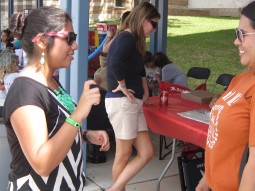by Emma Fitzhugh | Staff Writer
Now getting the chance to finally walk around, she has now arrived at this place after a little more than an hour’s worth of driving. After a green wristband is placed around her wrist, she continues walking into this school competely new to her. As she looks around, all she can see is hands moving all around yet, no words are spoken.
“It was..very silent. It was..actually a big difference, [from what I’m used to] and everything was so different. Like the bells in your class, and in the hallway; [instead] they had lights. I thought it was really cool,” freshman Myralexis (Alex) Tijerina said.
Tijerina has just walked into one of the biggest events in Deaf culture, known as the Texas School for the Deaf ‘Homecoming.’ This is an annual event that takes place in Austin, Texas, where other Deaf schools, along with the Deaf community all over Texas, come together to enjoy over 65 different booths (with food and drinks, t-shirts and other items for sale, and more), a volleyball tournament and a football game, as well as simply reminiscing on the shared experience of what’s like being Deaf and attending one of the very first schools built specifically for the Deaf population.

Dr. Janellkay Brigham, American Sign Language (ASL) I-IV teacher and ASL club sponsor, as part of the community herself, explains just how much of a trademark this school is for Deaf people all over the world, even though it may not be exactly like the homecoming most people are used to.
“Well, it’s the [only] residential school for the Deaf [in Texas]; every state has one. Ours is in Austin. Because it is the only residential school in Texas, kids fly there from all over Texas. It is called a ‘Homecoming’ because it is a formal regional high school for Deaf students, so they have Homecoming courts and everything we have here, except the dance,” Brigham said.
Brigham went on to say how it’s the generations of TSD alumni, since the school’s opening in 1949, that make this event that much more meaningful than just any other school’s homecoming.
Regardless of how many people are at a deaf event, Brigham still encourages her sign language students to be actively involved, even if they are new to the deaf community.
“First, I want my students to just watch deaf life, you know to just take it in. I expect them to be involved, curious, and open [to chatting with at least one deaf person], because if they don’t, then they are considered rude,” Brigham said. (Brigham went on to explain how the ‘foundation of [the] deaf culture is interaction’).
And after attending her first official deaf event, Tijerina knows all about taking everything in.
“I was with my Mom as soon as I got there [to TSD], and we were like, ‘Wow, it’s so silent, so peaceful’, but it was nice. I saw a little bit of the [volleyball] game, and there was this one girl who was trying to ask me to buy something, and she would always say ‘Please, please’ and I would say ‘No thank you’. It was so cute,” Tijerina said.
Another fellow ASL club member shares her experiences of what it is like attending deaf events, and interacting with the Deaf, both individually and as the club’s new Vice President.
“We [the club] go sign to children at the elementary school [Oak Meadow], and we sign Christmas songs to them and sometimes we go to Deaf picnics,” junior Alexis Coulter said.
Coulter went on to say how she felt when she first started learning ASL, and how she had to adapt to more than just learning a new language.
“Well yeah [did know the ASL teacher was deaf], I thought it would be different at first, but she’s [Dr. Brigham] just the same as everybody else. I thought it was going to be hard to communicate, but now that I know a bunch of signs so it’s okay,” Coulter said.
Coulter went on to say what she enjoys the most about being a part of this deaf community, and how she plans on continuing to be a part of it.
“[Just] signing to the children [is my favorite deaf event to be a part of], just because of the smiles on their faces…I want to be a teacher when I’m older, so maybe I’ll incorporate it [ASL], if I ever need it,” Coulter said.

